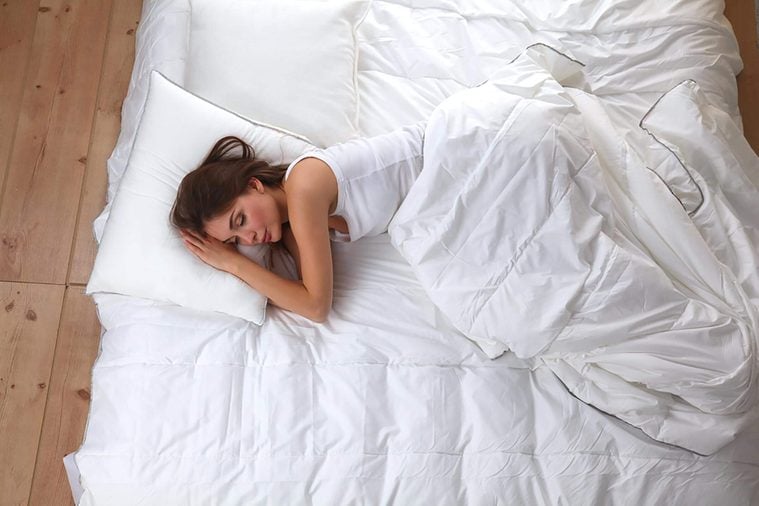The 2 Best Sleeping Positions for Your Health, According to Science
Updated: Dec. 21, 2023
One simple adjustment to your sleeping position can improve your circulation, ease back pain, and prevent snoring.

How do you sleep?
Tossing and turning until the wee hours of the morning should be the exception, not the rule. But if you’re among the 50 to 70 million American adults who suffer from sleep disorders (per the Centers for Disease Control and Prevention), you’re all too familiar with this nightly routine.
While it’s tempting to blame your mattress for your troublesome sleep problems, some experts suggest the real culprit might be you’re not dozing off in the best sleeping position. Science says some sleeping positions will not only help you get a better night’s rest but also prevent health problems. And it could take just one simple tweak to discover the secret to a better night’s snooze.
The worst sleeping position
It may be a good position for skydiving, but lying spread-eagle on your stomach is not the best sleeping position, the National Sleep Foundation says. While sleeping on your stomach might help alleviate snoring, it can pressure on your muscles and joints and cause aches, irritated nerves, and numbness. According to WebMD, sleeping on your stomach can also strain the lower back and neck, and your back, which could actually make snoring worse. To avoid this, prop your forehead on a pillow to allow room to breathe while sleeping face down.
Luckily, only about seven percent of adults default to sleeping on their stomach. Health advantages (and disadvantages!) aside, you might be curious to learn the link between your sleep position and your personality.
The best sleeping position for you
The best sleeping position for you may depend on any preexisting health conditions. “The best position to sleep in is likely on one’s side,” says Brian Koo, MD, a Yale Medicine neurologist and sleep specialist, who is the director of the Restless Legs Syndrome Program. “Sleep apnea and snoring become worse when one sleeps [on their back]. If there is no snoring in the supine position, then sleeping supine is okay.”
If you’re not a snorer, sleeping on your back also works well, according to the National Sleep Foundation. Though only eight percent of people sleep on their back, doing so takes pressure off your head, neck, and spine. If your head is properly elevated, it can also help prevent acid reflux. Make sure your mattress supports your preferred sleeping position to further help your health and your ability to get a good night’s rest.
How to best sleep on your side
Most adults sleep in a fetal position, according to the National Sleep Foundation. If this is your preferred position, there are ways you can doze off on your side and make it the best sleeping position for your health. Curling up too tightly can restrict breathing and leave your joints sore. You can improve this by straightening out your body as much as possible and placing a pillow between your knees to prevent strain on your hips. Koo recommends not sleeping with your head on your arm or hands because it can cause nerve damage.
For most people, the healthiest way to sleep is on your left side, curling your legs and placing a pillow between your knees. This position can ease any back pain and prevent loud snoring, according to Dr. Josh Axe. He says it can also help acid reflux. The National Sleep Foundation says it’s also the best choice for people with sleep apnea, though it can lead to wrinkles since half your face is pushing against a pillow. Not suffering from any of those ailments? These are the best sleep positions for every health problem.
Get more infectious disease insights from The Healthy @Reader’s Digest newsletter. Follow us on Facebook and Instagram, and keep reading: